Podcast: Play in new window | Download
Subscribe: RSS
Charles William Rotsler (1926–1997) was an award-winning artist and science fiction author.
Bill was also involved in the burgeoning adult film industry starting in the late 1950s, first as a stills photographer on the set of adult films, and later when he wrote, directed, or acted in over 20 adult films during his career with Boxoffice International Pictures,
In 1966, he created Adam Film Quarterly, later called Adam Film World, one of the earliest magazines to provide commentary on pornographic films. He wrote hundreds of articles using a plethora of pseudonyms including ‘Shannon Carse’, ‘Cord Heller’, ‘Clay McCord’, and ‘Merrill Dakota’ – sometimes even interviewing himself. He also wrote the seminal book, Contemporary Erotic Cinema in 1973.
But this series of articles is not about Bill Rotsler. It’s about a group of friends of his. Four friends. Four women, to be more specific, who at various times lived with him, and featured in his films, photographs, and magazines. Their lives intersected in his house, as they played their parts in helping establish the adult film industry in Los Angeles.
He called this group, ‘The Gruesome Foursome.’
The Rialto Report tracked down each of the four to hear about their lives. This is the third part: Uschi Digard.
The interview is taken from our podcast with Uschi. We have added additional information taken from lengthier conversations we have had with Uschi over the years.
All photographs are taken by Bunny Yeager, and are courtesy of Grapefruit Moon Gallery.
You can read Part 1, the story of Kathie Hilton (and Gerard Broulard) here , and Part 2, Malta’s story here.
———————————————————————————————————————————————-
Uschi Digard
Uschi Digard always seemed to be larger than life. She was an indestructible, formidable, pinup beauty who was emblematic of the sexual revolution in California. From the late 1960s through to the early 1980s, she was in hundreds of magazine spreads, had many issues dedicated to her, and appeared in countless softcore films, too. Her Amazonian features and natural good looks meant she was always in demand as she proved popular with fans. Or in the words of director Russ Meyer, her close friend and frequent collaborator, “She was a buxom cantilevered barracuda who was a Trojan at work.”
Russ was a man’s man, a World War II veteran, and a tough task master, and in Uschi he met his match and found the perfect foil. The combination of her sex appeal with her own sentimental tireless work ethic resulted in a close friendship that lasted decades. But for someone with such a larger than life presence, Uschi was also elusive and deeply private. Her face and body may have been all over the magazines, but her own voice was notably absent. Throughout her long career as a nude model and actress, she revealed everything, but revealed nothing. She rarely gave interviews, and the scant biographical information that was published was often fabricated. It was said that she was an interpreter of the United Nations. She came from Sweden. She had a perfume line that was big in Asia. And if her published birthdate is to be believed, then she recently celebrated her 70th birthday. All this is false. And as it turns out, the wealth of untrue information bothers Uschi herself as well.
The trouble is how do you correct so many misconceptions without drawing attention to yourself? How do you go public, but stay private?
*
1. Childhood
I suspect the theme of our conversation today is going to be the rumors and misinformation that have circulated over the years, which I’m hoping we can set the record straight. So let me start with one right at the beginning. There’s been much conjecture about where you’ve come from. I’ve seen references to Sweden, Switzerland, Holland, and my favorite is Bismarck, North Dakota. So where were you actually born?
Actually born in Switzerland, but lived in all those countries, apart from Bismarck, North Dakota.
I don’t want to be indiscreet and ask your birthdate, but there is a birthdate that’s widely quoted as being August the 15th, the 1948.
Totally wrong. Couldn’t be wronger.
Well, let’s leave the mystery there. What was the nationality of your family?
Swiss French.
Did you have a big family?
Yeah. I was the youngest by eight years.
How did that shape your character?
It kind of made me think more like an adult and be more independent. And I always did my own ship. I remember when I was little – and things didn’t go the way I want – I would move out temporarily. I had two neighbors that would put me up. So if my mother rubbed me the wrong way, I would have a little bag and I’d pack it and I’d move next door. Just wherever the smells were better.
How did everyone treat you?
I always got treated as an adult because my siblings were adults practically when I was born. They treated me like one of them, and I appreciated it. So I never got treated like a little kid, and I loved it and I respected them for it.
What kind of school did you go?
I went to boarding school for many, many, many years with nuns. They were like convent nuns.
How strict was this convent school?
Very strict. We didn’t go home at night. We could only go home three times a year for holidays. We were never allowed anywhere. If we went for walks, it would be two by two with a nun in the middle and a nun in front. And we slept in huge dormitories in kind of tent like surroundings and no privacy whatsoever. And I hated it. To me, it was like prison.
How did that shape your feelings about religion?
Made me realize that (religion) wasn’t anything I ever wanted to do, that religion was a very personal thing and nobody should be forced to go to church three times a day or be forced to believe in a doctrine and find their own way. So it strengthened me actually, because it made me start to think about what I thought about life and God. So it was good for me.
Given that it was very strict, how did you react against that? What was your outlet?
Oh, I read a lot. We had a library there in the boarding school, and I must have read every book in that library and then realized that I couldn’t stand any translated book. So my ambition was to learn languages so I wouldn’t have to read anything that was translated. And I did that.
Did you actually start learning foreign languages when you were at school?
Yeah. I started with Italian. See, because of being brought up in Switzerland, we have three national languages, Italian, French and German. Before you can even attempt to take English, you have to learn those three languages. So I got fluent in Italian, German, and French – and then proceeded from there.
If you were in a convent environment, did this mean your contact with the opposite sex was restricted as well? Did you meet many boys?
None. Oh, no. None. Absolutely nothing. No. We were just girls.
How did that impact you in terms of not having boyfriends?
Well, I was a virgin, so it was no big deal.
When you lived back in home environments, were your parents quite strict about that side of things?
Yeah. Very, very religious.
And I presume that the prevailing standards of the time as well were quite restrictive.
That’s right. Yeah.
You always had a really healthy outdoor image in a lot of the later photographs that were taken of you. Does that fit in with your upbringing as well? Were you a very outdoorsy type?
Yeah. I skied. From the minute I started to walk, I skied. I became a pretty good skier, swam every summer, and just loved outdoor life.
Were you a confident child?
Very much so. Yeah. And pretty much set in my ways from a very early age. I knew what I liked and I knew what I didn’t like. I loved reading. Reading, reading, reading, and skiing. Yeah. Those were my two loves, reading and skiing.
What sort of reading did you like?
Spiritual, like Hermann Hesse type stuff, and a lot of biographies.
And what didn’t you like?
I didn’t like gossip and I didn’t like name conversations. So I kind of steered away from people that were boring or gossipy or liars, and went in my own direction.
How attractive did you consider yourself when you were a teenager?
Not very. Never gave it much thought, actually. No.
Were you an early bloomer physically?
Yeah. I had big breasts from the age of 11, and I wasn’t too pleased about that. I tried to hide them. So I usually would wear sweaters that were kind of large and bras that were too small so that I could let something hang underneath and something on the side and then covered it all up. And that made me look smaller.
So it doesn’t sound that boyfriends or sex was a big part of your teenage years.
No. Wasn’t even on the agenda.
*
2. Leaving Home
So when you left school, you finally got the chance to fulfill your ambition of learning languages. And you embarked on a multi-year European tour.
I’d work during the day and go to school at nights and stay in each country until I passed the degree, and then move on to the next country.
Where did you start first?
My Italian wasn’t too good, so I went to Italy to perfect my Italian. After a year in Italy, then I went to France and worked on my French. It was all right, but it wasn’t perfect. Then once I knew my French, I wanted to learn English. Written English, not just spoken English. And I went to the Channel Islands, Jersey.
Did you pick up English quickly there?
Unfortunately, I didn’t learn any English at all because all the other people were also continental so we never spoke in English. So winter came and Jersey got cold, (and) I thought, “Well, I’ve got to get a degree in English.” And so I got myself a job in London at The Regent Palace Hotel, which in those days was the largest hotel in Europe.
What was it like working there?
I am almost like a retard when it comes to directions. I’m normally a left-handed, but in boarding school, they tied my left hand behind my back and forced me to be a right-handed. And so all the things from school I do with my right hand, but everything that I do out of joy like tennis I do with my left hand. I think this is one of the reasons I have no sense of direction. And this hotel being so huge, it took me three weeks just to find the way to my room because every day I got lost.
Do you still have that problem?
I’m still abysmal. When we first came to L.A. and started driving a car in L.A…. those freeways, San Diego Freeway, east, west, north, south, it’s all the same to me. It would take me hours to get home because I’d get so lost. Still to this day, I have a horrible sense of direction.
What was it like living in London at that time? It must have been an exciting time.
I loved it. It was a beautiful time. Yeah. And I had my first boyfriend in London. Actually met him in Jersey, and then we came to London. It was wonderful, exciting time. And also musically listening to big dance, and living on my own, and no longer being affected by the church or by nuns was a great freedom. I enjoyed it thoroughly.
In the early 1960s, I’m guessing it was still relatively uncommon for a single female to be such an independent traveler.
I never really gave it much thought, because whenever I went somewhere I had gotten myself a job beforehand. Before I went to London, I got myself a job at The Regent Palace so I had somewhere to go. Or when I went to France, I got myself a job. And then immediately when you work somewhere, you meet other workers. So I always had a little family around me and I never felt lonely or estranged. I always felt very good.
So you’ve been to Italy, France, and then England. Where do you go next?
I first went to a little place called Cubelles, which is outside Barcelona, to learn Spanish. And then when the winter came and it got cold and I hadn’t learned enough Spanish, and someone told me, “There are these islands called the Canary Islands where they speak Spanish, and the weather is beautiful, and it’s gorgeous…”
This time you didn’t have any work lined up, though.
The first time I went somewhere without a job.
How did you get to the Canary islands, because it was quite a journey at that time?
I took one of those boats that only travels in the night, the cargo boat, and it went through Spain, Malaga, Alicante, then it went over to Tangier, Marrakech and finally arrived in the Gran Canarias after three weeks, and I was there without a job.
So what did you do?
Again, I helped myself, got myself with job, and indeed ended up spending four or five winters there working, and then in the summer I would travel around.
What kind of work did you find in the Canary islands?
By then, I already knew Italian, French, German, and English, so I immediately got a job as a linguist.
That must have been useful because of the tourist trade out there.
A lot of foreigners, particularly German and English people would vacation in Canary Islands. And I worked in the jewelry business, and the jewelry there was very cheap in comparison to the rest of Europe. People got to know me, so they would come from England and say, “We saved up four or 5,000 pounds. What you think we should invest in this year?” And I would show them the baubles that I thought would be of interest to them.
And how did you get paid?
I worked at a percentage. So whatever I sold, I would get my certain percentage, so I made a lot of money.
That sounds like a lot more than just linguistic work. You sound like you were a salesperson who had some understanding of the product as well.
I kind of learned it as I went along. And indeed, I then worked in Europe – in Sweden and Switzerland – in foremost jewelry stores as a jewelry sales lady.
Would you say you’re good at the sales side?
Yes. Excellent. Because I don’t try and sell something that I don’t think is right for someone. If I feel it is too much for a person to spend or whatever, I would steer them in the direction of something that would be a little more modestly priced. And I always had the customer’s interest at heart, not the seller’s interest. And I think that’s why people kept coming back to me and I became an excellent sales lady.
So you would work the winter in the Canary islands and get commission from the sales, and that would presumably give you enough money for the rest of the year to travel.
That’s right.
It was in the Canary Islands that you met your husband.
I had actually seen him before when I lived in Jersey. There was this night club called The Watersplash. A very fancy night club. And I used to go there, and Ron was there with a band. But we never met. I just would admire his drumming, but that was it. And I didn’t really meet him until four years later on the beach.
Was he in the Canary Islands to play music as well?
He had his own band there.
Was it love at first sight then, once you saw him in the Canary Islands?
Interest at first sight. Ron and I have been married for almost 50 years.
What kind of music did he play?
He had his own band, and they were brilliant. They were bass, drums, piano and horns. And they played jazz, rock n’ roll. They also sang in harmony. If you remember a band called The Hi-Lo’s. They were very well liked because they were different.
So having met Ron, you have this job in the jewelry business and he has his job that I suppose involves a lot of traveling as a musician, where did you go next?
We went to Israel and we were there during the Seven-Day War. (His band) became a big hit in Israel.
This was a troubled time in the history of Israel.
It was very interesting because there was still a lot of fighting going on. In fact, I remember we would have fans that would come one week to listen to the band, and the next week two or three people would be missing and we’d inquire and they’d say, “Oh, they got shot during the week.” It was a very terrible time and a very unhappy time for the Israelis. But we found them to be very, very generous, good human beings, and we admired them very much for what they stood for.
And the reason you went to Israel was because of Ron’s music?
Yeah. He had an agent and he got a great contract in Tel Aviv.
Was it at this stage that you got married?
We got married in 1967 because it became a hassle when you weren’t married with hotel rooms. So it was easier to be married. That’s why we got married.
And after Israel, you went to Sweden.
That’s correct. (His band) became the hot band, and they had a weekly TV show. I worked in the jewelry business because in the Canary Islands, I had met a jeweler who had a jewelry shop there and he says, “If you ever want to work for me, just give me a call.” In those days he had 40 jewelry shops all over Scandinavia.
As soon as I contacted him he said, “How soon can you start?” And I started working for him in one of the best jewelry stores in Scandinavia, and ended up buying diamonds for all the stores all over Scandinavia. I was the main buyer for the 40 stores. And we liked Sweden.
What was Sweden like at that time?
Very interesting. We just did like the winters. Boy, can it get cold! We stayed there during the winters because Ron’s band got steady work, and they had their TV show, which was very much like the Beatles had later on – where they did scenes, like they would ride elephants and then they’d play ‘Baby Elephant Walk’, or they’d be skiing down a hill. The show became a huge hit. They did very well in Sweden, so we stayed there for three years.
So where did you go to next?
Then to Mexico. We were in Mexico during the Olympics.
Oh, the 1968 Mexico City Olympics.
Right. They opened a new hotel there called Camino Real, and they booked Ron’s band for the opening.
What did you do in Mexico? Did you continue to do the jewelry work?
I tutored college students in language work
Was that relating to the Olympics?
Yeah. I did that too. I had to pass an exam, and then I started translating for the Olympic Committee.
*
3. Modeling in the United States
So in 1968, you decide to move to the U.S. and to Los Angeles. Was that to pursue Ron’s music career?
He got a contract with a band called Les Brown and His Band of Renown. Les Brown’s band was very famous in those days. So we came to the United States and we lived in Venice, California.
What was that part of L.A. like in the late 1960s?
It was the best time I think of the L.A. era to live in L.A. because it was the hippie era. They had these ‘love-ins’ at the beach, and it was just so free… flower-power and grass. It was just a very, very happy time in L.A. Now, L.A. is unbelievable. It’s horrible. But in those days it was really, really the place to be.
And I would imagine that there was plentiful work for Ron as well due to the music scene there. Who were the sort of people that he played with over the next few years?
He was on the road with Ray Charles for many years. Then he joined an avant garde band with Don Ellis. Don Ellis was the one that played in the unusual time signatures, which most musicians found very difficult to play. Instead of 4/4, they played 8/9, 12, 15 beat. And it was a big challenge and he enjoyed that. (Then ) he went on the road with a lot of people… Jack Jones, Marie and Donny Osmond. You name it, he went on the road with them.
Now, I imagine it was not easy for you to get work straight away when you got to the U.S. because of the situation regarding work permits and green cards.
We didn’t have working permits right at the beginning. I immediately went to the language school, Berlitz. They had one on Hollywood Boulevard and I asked them if they could employ me as a linguist or translator or teacher. And they said, “Yes, of course. Just bring us your green card and you’ll get to work.” (But) I didn’t have a green card, so that was that.
I presume that’s how you got into modeling, because that was one type of work that didn’t necessarily need…
I didn’t need a green card for that.
Yeah. So how did you find your first modeling work?
I saw an ad in the Los Angeles Free Press, and they were asking for models, and there was a model agency on Hollywood Boulevard called Pretty Girl Agency.
Do you remember the guys who ran the Pretty Girl Agency?
Hank Cline and Dick James. And I went in there and said, “Do you think you could use somebody like me?” They immediately put me to work, and I worked every day. And from earning modest fees like $50 a day, I ended up getting a $1,000 a day.
So that became your full-time job for a while.
Yeah. I thought, “Translating can wait.”
What was it like at first? Was it typically just you in a shoot, or was there other models in the same shoot?
No. In those days, you had all those pretty girl magazines, like ‘She’ and ‘Modern Man’ and ‘Allure’. There were a lot of pretty girl magazines, which are pretty modest in today’s standards. They barely showed pubic hair.
Then you also worked for the Japanese market a lot, which meant absolutely no pubic hair and no nipples. Just a swell of the breast, but no nipples. You had to cover it up. They’d have these gory magazines like with executions and blood, but the girls couldn’t show their nipples or the pubic hair! It’s amazing the way you look at life. So it was pretty modest in those days.
How much modeling work did you get?
I got so busy modeling; I could have worked seven days a week if I wanted to. And the money got bigger and bigger all the time, and everything was on my terms.
Did you have any inhibitions about posing for the magazines at first, or was it fairly natural?
No, it became very natural. As soon as we were in L.A., we also joined a nudist place called Elysium Fields up in Topanga Canyon. It’s a beautiful place. In fact, we were some of the first people there. When Elysium Fields was (first) opened, we were part of the group of people that planted some of the trees to made it pretty. And we helped build the tennis court.
Nudity was just part of our life. It just felt very natural to be nude. So if somebody was willing to pay me and carry me until I could get a real job, I was very happy to just pose nude. It never, never bothered me.
It was a real heyday for nudism. And what was the attraction to you?
It’s just totally natural. I always felt that when people went nude, you knew whom you were dealing with. Very often people are hiding their character between fat suits and briefcases. Once they’re stripped of all that, what you see is what you get and people are more honest. That’s what attracted me.
Swingers clubs were starting to be big around that time too. Did you find that there was a crossover between the two?
Well, it was kind of a two-faced. Apart from Elysium Fields, there was another nudist place, and it was higher up on the same canyon, and it was a swingers club. I can’t think what it was called right now. And because they knew of me because my modeling, they invited us to go up there once. And so Ron and I went and we hated it. One of the scenes was there was a big, big hangout room and there was this huge water bed, and there were about five couples making love on that water bed. And then there were two guys with a stopwatch timing them to see who came first, and we just found it horrible. You had to be careful you weren’t standing freely because somebody would sneak in behind you. It was just so horrible that we left.
The Elysium Fields was just delightful. It was a nudist place, it was free, it was just great. And it did have little rooms if people wanted to go in and make love, but then that was private. It wasn’t a huge orgy place.
I remember reading an interview with British actor, Patrick Macnee, who stared in The Avengers, the television series. And he mentioned that he used to go to the Elysium Fields as well around about that time.
Yeah, it’s funny. That’s where we met Patrick and became good friends. In fact, we had a little routine while we were in L.A. He would come to lunch at our house every Monday, and every Friday he would take us out to lunch somewhere.
Once when we were at Elysium Fields, I was reading a magazine, and I turned around to Patrick and said, “Hey, Patrick. You’re called Best Dressed Man of the Year. Isn’t this funny? I never seen you with any clothes on!”
Was your experience of modeling all good?
I have to say that although many girls that I later worked with said how abysmally they got treated by photographers, I never had a bad experience. I always got treated the way I wanted to be treated, and I always got paid, and in fact I got spoiled. They would bring me flowers and God knows what. So I had no bad experiences.
Why do you think you were always treated so well?
I think to a great extent, a person gets treated the way they want to be treated. You give off an aura, and my aura was, “Okay, you take me at my beckon. Whatever I say goes, not what you say.” And so it worked.
Did Ron ever join you on any of the photo shoots?
Ron did a couple of shoots with me. Actually, he kind of fell into it because in those days I didn’t drive, and so he had to take me to my modeling assignments, and one of the male models didn’t show up. So they used to Ron. And so he got involved in a few of the modeling shoots.
You know those big matches, those long matches for fire places that come in these long boxes? For a while, they sold these long boxes, and there was a picture of Ron standing on the box, and I was cuddling his leg. Both of us were nude, and it’s a great matchbox cover. He did quite a few shoots with me.
So he was a musician and a model then?
No. Not really a model, but he did it a few times.
One photographer that you worked with at the beginning was Bill Rotsler.
Oh, I adored Bill Rotsler. I worked a lot for him. In fact, he’s one of the first people I worked for. When I started to work for a photographer, normally a girl shoots with them once or twice. Bill would book me for a month, like five days a week for a month. And so I started working for Bill on a regular basis.
In those days I didn’t drive a car, and Bill wasn’t too happy to drive me home. I spoke eight languages, but I couldn’t drive a car. I thought I’d gladly give a language to drive a car. So I always needed a lift home so Ron would have to come and find me and pick me up.
Bill lived in the Hollywood Hills, and Bill had a house which was like a Turkish harem. It was all Turkish carpets and huge pillows. And it was just a party house. It looked like a tent in the Arabian night. We spent a lot of time hanging out there and having a wonderful time. It was like a second home for us. We just ended up always hanging out there after work. And Bill became a dear, dear friend.
People like Harlan Ellison used to hang out there as well.
Harlan Ellison? Yeah, he was there a lot.
And wasn’t Bill a really good cook?
Well, actually he was great at putting pouches into boiling water, and then cutting the pouches open and the food was delicious. That’s the first time I ever saw people cooking with pouches, and boy, did it taste good. Like curried rice and tikka masala chicken all out of pouches. Delicious. And he was always very generous.
You worked with Bill for several years.
He started to have a problem with his hands.
You mean like arthritis or something?
No. The thing is they’re like paralyzed. Because he was a photographer, he couldn’t take pictures anymore because he couldn’t move his fingers. And it was very painful, and that started to get worse and worse. So he started to run into money problems because he couldn’t take pictures anymore. And so he didn’t have such a good end.
Were you ever interested in actually buying the magazines in which you appeared?
I have a lot of the magazines. I don’t think I ever bought one, but they were given to me or sent to me. So I have a whole bunch of them, and there are two or three books that are just Uschi books. I think I have those, but I don’t think I ever paid money for any of those.
*
4. Working in Films
So most of the modeling work I guess you get through the Pretty Girl Agency.
Yes, and then later on with the guy by the name of Hal Guthu.
Yes. Hal found you more work in films.
That’s right. Yes.
What was Hal like?
I liked him a lot too. Very shy. I think he had a hindrance, maybe clubfoot or something. He was limping a little bit, but very sweet, very honest. If Hal would recommend me for a gig, I knew it was upfront, the money was all right, and I could trust him. And I liked him enormously.
Hal was the agent for a lot of actors at that time. In fact, he managed Rene Bond, for example. Hal passed away in 2000 after a fire in his office and he was found shot in the head. It was ruled a suicide at the time. What’s your take on this?
I have no idea what happened. When his place went up in flames, his parrot also burned with him, and that parrot was his life. It just doesn’t make any sense.
Starting in 1969, you start to work in films in addition to the modeling.
It’s all called sexploitation films, which were like softcore nudie films.
Did the films pay more than the modeling?
It depends. In the beginning, as I say, I only got $50 a day for the modeling, but then later I got so much money that it would pay more than films. It’s just that films would last one week, two weeks, sometimes three weeks in this one location, and so you’d make regular money in the long run.
Let’s talk about your film work. And I’d like to start at the first film you did with Russ Meyer, Cherry, Harry, & Raquel!
That film was already finished and it didn’t work. For some reason, Russ didn’t like the way it showed. And then I came into it. He saw me and he cast me, and he would go and get me in different situations like underwater in a pool, or in the desert on a railway station, or like a secretary, or running up the mountain in boots… and wherever the film wasn’t working, he would put in little shots of me. And really, with no sequence or no rhyme or reason. And for some reason, it pulled the film together and then we released it.
What do you remember about meeting him for the first time?
Well, he was very Germanic, because his father was a policeman and he came from German stock, so I knew exactly what to think of him. I knew what he liked because I’m a Germanist, so we got along just great.
It sounds like you had very similar backgrounds.
Right. And indeed, I ended up working a lot for Russ not just in the films, but as co-producers – and doing everything from casting to makeup to cooking to you name it. To paying the bills.
Had you seen any of Russ’s films before you actually met him for the first time?
I’ve never seen one of Russ’s films.
Still to this day?
No. Never.
Did this extend to all the other films you made?
I’ve never seen one. I’ve never, ever seen one. I’ve just never gave it a thought.
Why do you think that is?
I think it’s (that) I don’t particularly like to watch myself, because I immediately think what I could have done better, or awkward pose or whatever. So I never put myself into that situation where I have to critique myself.
That makes a lot of sense.
So I never bothered.
I read a quote that he said about you. He said that you, “had the dedication of a Watusi gun bearer, and was somebody who could run over cut glass,” which I guess really appealed to him because you had the sex appeal that he was so interested in, but at the same time you had the work ethic and the strength of character that he obviously admired.
I remember in ‘Harry, Cherry & Raquel!’ that on one shoot, I had to wear thigh-high boots and run up a mountain in these boots. The boots were two sizes too small, and he wanted to get the sun coming down, me going up the mountain and topless, and it had to be just right. And I also had to run down again. Now, running up wasn’t so bad, but coming down, the breasts really hurt. And then he had a little Jeep with a red light flashing all the time, and that was an effect. By the time we were finished shooting, his battery had died because he used the battery of his Jeep all day long to get the light going. And here we were stuck in I think it was Death Valley. Stuck in the desert, no car, and he said, “Okay, let’s use the last light to take a few stills.”
And he’s shooting stills, and I hear this clicking, and there’s this rattler right next to me. I say, “Snake!” And he says, “Don’t move.” He always had a gun with him. He shot the snake’s head off, never said a word, and we continued shooting. He says, “Okay, move more to the left. The breasts are not at the right angle.” And that’s how he was. That was rough. We didn’t have a battery, so he ended up starting the battery of his Jeep with the battery of his camera, and he got us home. And he just was a task master.
Then at the end of the shoot, he’d wine and dine us and take us to the best restaurants. He was a good guy. He was just old school. You know, German old school. Work, work, work, and then play.
Russ used the name Astrid Lillimore for you I think in that movie. I guess the reason why you had so many different names at that time was because you still were getting your green card and your papers in order, and therefore used different names to hide your identity. Would that be fair?
You got it in one. I got paid cash and I didn’t want to be recognized. I remember I went to a book signing in Newport Beach, and the press came, and there were some books that I was involved with, and the press wanted to have interviews. And so I always would push everybody else in front of me, and I would go to the bathroom until they’d be gone because I didn’t want to have any press or any celebrity or anything like that.
But I have to add, even though I worked all these years so-called illegally, I paid taxes right from the beginning. I never did not pay taxes. I was very strict about that, because I knew one day I’m going to be legal. But I just didn’t want them publicly. I just wanted to get my money and disappear.
You acted in a lot of films at this time, but a lot of the roles were very small and you were uncredited. I presume that was for the same reason then.
That was my wish. Whenever they wanted to give me something bigger, I asked them not to. I got a part in a film actually with Richard Burton in Acapulco, and the part I got was to be a band leader, and I turned it down because I felt it would be a little too much publicity. Too big a film. So I never did it.
Let me ask you about the name that you eventually decided upon, Uschi Digard. Where did the Uschi part come from?
Ron had a girlfriend and really liked the name Uschi. Uschi is an abbreviation for Ursula.
That’s the real name, Ursula. And so we used that. Digard got used by one of the guys I worked for, a black guy (called) Ted Williams. He worked for a lot of magazines. He was an excellent photographer, who was famous for photographing jazz music legends.
I said, “Okay, Uschi what? Uschi what?” He says, “Oh, Uschi Digard. That sounds good.” I said, “All right. Uschi Digard it is.”
Is that Digard that ends in a D or a T?
D.
Yeah. D-I-G-A-R-D. Digard.
And is there any meaning to Digard?
I don’t think that name exists, actually. Have you ever heard anybody else being called Digard?
No. Never heard anybody.
You appeared in so many films between 1970 and about 1974. Was it difficult to keep track of actually what films you’d made?
I usually knew the working title, but by the time the films get released, they have different titles. So I wouldn’t even know what they’re called anymore.
A lot of them were quick one-day wonder shoots. How much fun were they to make?
Some of them were more fun than others. Depends who the director was. I always expected to be treated the way I wanted to be treated, and everybody did. So I had fun. I had fun going to work. If I got a job that there was something wrong with it or I didn’t like the directors or producers, I would withdraw. Because by then I made enough money I really didn’t need certain jobs. So I only took jobs that I knew that people had recommended to me. Either the agents were saying, “These are good people and you’re going to have fun,” or I wouldn’t take it.
I’m interested in the fact that you appeared in a lot of low budget sexploitation films, but then you would pop up in some mainstream films as well. What was your experience of the differences between the two?
I had a great more fun doing those sexploitation films than I had doing the legitimate films, because I worked with Sam Peckinpah and Robert Duvall and quite a few people, and I got more sexual harassment in those films than I got in this sexploitation films.
How did that happen?
The casting directors for the sexploitation films were gentleman, were down to business, told you how much you’re going to make and what you can expect. The casting directors for the so-called MGM and Fox would say, “Look, little one. We have five ladies like you up for this part. Which one of you is going to give out? She’ll get it.” And there you go. So I’d say, “Forget about me. I’m not in.”
Why do you think that was?
You see, sexploitation films, there wasn’t all that much money. You went down to business. The big, big films, there was a lot of casting couch stuff going on. I don’t say everybody was like that, but more often than not, whoever went to bed with the big producer would get the part, and I found it disgusting. They just thought because we did some sexploitation films we were easy prey, and we were not.
Yeah. Do you have any specific memories of working with Sam Peckinpah?
I remember I did five films with Sam, and he had unusual methods to get the actors doing what he wanted.
Like what?
Like if he wanted a specific reaction, he was not above taking amyl nitrate capsules and breaking it under your nose to get the reaction he’d want. He was quite an unorthodox, but he got results.
Did you actually enjoy the acting part of the films?
Yeah. I actually just for fun joined an acting (school) at the Celebrity Centre. I didn’t even know what Scientology meant, but they had a great acting school in downtown L.A. at the Celebrity Centre. So I went to acting school there and loved it, and only pulled out when I realized they were trying to convert us to Scientology. But anyway, while I was going there, there was a great teacher, and we did some good things, and I felt I had talent as an actress. And I enjoyed it. It was really good.
You also have a great sexual presence on screen. How much of this do you think was your acting ability, and how much were you really getting into the moment?
Mostly it was just trying to do a good job, but once in a great while I would have chemistry with someone. I understand from people that would’ve seen those scenes and know me well enough, they’d say, “Hey, you really dug him,” or, “You really did great.”
I’d say, “Yeah… I’ve got to confess.”
How easy did you find these scenes?
Acting is one thing, but if you have absolutely no chemistry with the other person, it’s hard work. And if you do have chemistry, then it’s like falling off a log.
So once you actually got your green card, you became legal, you continued to make the films and continued to do the modeling. I guess by this stage you were earning such a good living that it didn’t make sense to pursue a career doing translation, for example.
Actually, I immediately also got a job and I worked for Weber Aircraft in Burbank, in the spares department. So if any aircraft that was needing a part that was grounded, my department would get the needed part and get them off the ground and get them going again.
Working in an office was a new experience for you at that point, I guess.
At the beginning, it was horrendous for me because I knew nothing about computers. All I knew was languages and jewelry, which didn’t help me in an aircraft department. And I had to start at 6:00 in the morning, and we had no windows. Just neon light. But then I started to think, “Okay. I’m going to do this as best as I can, and I’ll make it as agreeable as I can.”
So you were doing this work for the airline company at the same time that you were making films and modeling?
Yeah.
Did that continue then? Did you have day jobs throughout the early ’70s when you were doing the film and the modeling work?
Pretty much. Yeah. I was pretty busy.
I always thought that your film and modeling work was full-time, so you managed to fit in…
I was doing a lot of stuff. It just kind of blended in.
Did you enjoy that period?
Very much. And I started to love the computer, and I felt proud to be able to get these aircrafts off the ground in no time at all. There were lots of different languages involved. French airlines, Spanish airlines. So I used all my languages and learned about computers. It was good.
When I look at the films in which you appeared in the early ’70s, there are certain names that crop up time and time again that have always led me to believe that you must have had a circle of friends that appeared in the same films. One example of this is the actress Kathy Hilton.
Yes. I worked with her a lot.
Very honest, very sweet and very sad. I always felt that she was unhappy. And indeed, when I went one morning to her apartment I think before we went on a shoot, and I saw how she lived very, very frugal and very basic. So I don’t really know what her background was, but I just always felt her to be inhibited and sad, not easygoing like the rest of us. You know, happy-go-lucky. And indeed, she ended up sad.
She had a relationship with a wealthy man who ended up shooting himself while he was in bed with her, and shooting her in the head. He died and she didn’t. I went to see her in a hospital where you have no insurance, and it was pretty sad, the whole thing. And I don’t think she lived much longer after that. It was sad.
Another couple of your friends I believe are Maria Arnold and Malta. They appear in a lot of films with you.
Yes. Malta lived with Bill Rotsler, so whenever I worked for Bill I would see her, and we did a lot of shoots together.
I got close to Maria too. I think Maria used to pick me up when I didn’t have rides, so we got pretty close.
You did a number of lesbian scenes in the films as well. And I always wondered whether that was something that you were comfortable about, or whether it was more difficult?
No. Absolutely comfortable. Very natural.
Do you have any memories of two people who were involved in these sexploitation films right at the beginning, Marsha Jordan and June Wilkinson?
Yeah. They were like the icons that we were held up against. June Wilkinson had a house, a very pretty house, in the Hollywood Hills. And I ended up shooting there. So obviously she lent the house out to photographers for shoot, and she had these interesting planters all over the house, and they were her bras! She would cast iron her bras and then put plants in them.
And she said that she made a fortune endorsing some kind of equipment that’s supposed to make your breasts bigger. And she really got a lot of money. And I said, “Don’t you feel a little guilty, June? I mean, your breasts, God’s nature gave you the breasts, and here you are endorsing a product that’s supposed to make them bigger. Isn’t it a little hypocritical?”
And she says, “No, no, no. Not in the least, because what it does is the people use this machine. Whatever they have, it’ll make it better. So I don’t feel guilty.” So anyway, she made a lot of money.
Candy Samples had a similar thing.
What was that?
Candy ended up having a house in the desert. I was invited to the housewarming party, and over the fireplace was this huge painted portrait of her with her breasts. Now Candy is bigger than all of us together, so those breasts really looked enormous. And I saw that these conservative Palm Springs people kind of looked, and not looked, and whispered. So Candy says, “Listen everybody. Those tits paid for this house. If you don’t like it, you can go!” And that broke the spell.
How do you remember first meeting Candy Samples?
That was Ted Williams again. He was exclusive for this one magazine, and he did a shoot, an entire magazine just on Candy and me. When that magazine came out, I think it had sold out almost immediately. It was a book, just Germany, and then we got a lot of work through it.
You worked quite a lot with Candy. How was she to work with?
Great. Candy and I, apart from doing a lot of shoots together, we worked for another agent that gave parties, celebrity parties. And in the ’80s, that was quite big in Hollywood where men that were divorced or whatever would put on big parties by renting a tent and a caterer and everything, and Candy and I would be hostesses. And sometimes we’d be topless, sometimes not. If there was a single man that didn’t have anybody to talk to, we would go talk to them or introduce them. And so we did a lot of those parties together, and we got quite close. She was a nice lady.
And you did plenty more modeling with her too.
We also did a couple of magazines together that is just she and me around a nice pool somewhere I remember.
Wasn’t one of them shot at Bela Lugosi’s house?
No. At Bela Lugosi’s house, I worked by myself for photographers that had the most fancy equipment that I’ve ever seen in my life. I mean, umbrellas, lights, you name it. Ron would drop me off at the Pancake House in Hollywood. (The photographer) would come pick me up every morning. And we’d stop at the bank and then go to the shoot at Bela Lugosi’s house.
One morning the photographer didn’t show. And Bela Lugosi’s house is interesting because everything had to do with blood and coffins. You’d switch on the light and blood would drip down. The dining room was a huge coffin. It was just a macabre house.
So anyway, one day (the photographer) picked me up, and we did the shoot usual, but the next day he didn’t show. But the FBI showed up at my house. He’d been robbing banks.
The photographer had been robbing banks?
Yeah. Whenever we stopped in front of a Bank of America, he’d go in there and case the scene. And then if it was no good, we’d go do the shoot. That last day (we worked together) he (went into the bank and) said, “Give me all your money or I’ll shoot,” and they gave him the money, and that was that. And everything he owned was stolen.
No wonder he had such good equipment.
That’s right. And when they showed up at my house, they said, “What’s your relationship with him?” I said, “I’ve been working for this guy.” So that was Bela Lugosi’s house.
But with Candy, I worked in some really nice houses and we worked in a lot of celebrity houses together. In Lou Rawls’ house, we worked… I remember (it was) the day before Thanksgiving… and the chef in the kitchen made this incredible stuffing that really whet our appetites. So we would hang around the kitchen to see if we can get little tidbits.
One person that you and Candy worked with was the actor John Holmes.
Yes. I worked with him many times.
What was your memory of him?
Oh, a really, really nice gentleman. Shy, easygoing and modest. Even though he had a huge endowment, (he was) great to work with, very supportive, so I can only say good things about him. All he ever wanted was eventually owning a sheep farm. That was his dream. And he was a sweet, sweet, gentle guy.
The only problem with John is that he got hooked on cocaine. And he needed cocaine and he didn’t make enough money to support his habit, and he fell in with the wrong crowd, and then he was witness to some kind of a murder, which makes things a little more difficult. And so things were just getting from bad to worse for him.
I saw some interesting loops that you made with Candy, which were wrestling loops.
Yeah.
Had you had experienced wrestling before?
No. None whatsoever. But I took to it like a duck to water. Loved it.
There was a guy, I can’t think of his name now, in Hollywood who actually was a wrestling promoter for legitimate wrestling, and he saw an interest. And so he went to Hal Guthu and he picked me out of a book and some other girls, and then he started testing us to see which one of us would have aptitude, and I immediately took to it. So we started to make a series of wrestling and boxing films, and I became a star. Yeah. I absolutely loved it. And I did quite a lot of wrestling after Candy, and then got some lessons by an ex-wrestler.
He did a whole series of wrestle films with me. And instead of just play acting, it was serious. We were really wrestling, and it was a lot of fun.
Didn’t you also wrestle with your husband?
I used to like wrestling. When we lived in Sweden, Ron and I used to wrestle, and whenever it got a little too heated, one of us could call “ding” and we immediately had to stop. And I remember once he was just getting me in the mouth and I called “ding.” And as I’m calling “ding” one of my teeth was flowing out. So he actually knocked one of my teeth out. It was just in fun, but he just got me wrongly and I called “ding” little bit too late. So anyway, I’ve always loved wrestling and boxing.
You also did some stunt work on some of the films as well. Is that correct?
Yes. Just fake hitting, fake falling, that kind of stuff.
And you did that for other actresses as well?
Yes. There were some actresses, and they didn’t really want to do too much because they might break a nail, so I would volunteer. So they keep my face off (the screen), and I’d put on a wig similar to their wig, and then I did the stuff they didn’t want to do because I always enjoyed that, the physical things.
Given that you haven’t seen any of your films, I presume if I say some names, they’re not going to mean much to you. So for example, there was an early film called Getting Into Heaven… Do you remember that?
Yes. Yes, because I had a poster of that. I was topless in blue jeans in different positions. Yeah. I remember it from that, but of course I never saw the film.
How much did you like making films?
I enjoyed the film work, and particularly I loved going on location. I did a film, a Western, where we spent like two weeks, somewhere on location and did some stunt work. I always loved that kind of thing.
Do you ever recall doing much publicity for any of your films?
There was a series of them. One was called If You Don’t Stop It… You’ll Go Blind and Can I Do It ‘Till I Need Glasses? I did publicized those films, and I traveled all over the United States, and I would give lectures to college kids and go on all the TV and all the talk shows.
Now, you started out by making films when they were all softcore, but after a while the films became more progressively explicit. And there’s always been the question as to whether you actually did any hardcore work.
Never did. Never once. What had happened is they have made or they have shown some films where they inserted hardcore (footage) into films that I did, but that’s somebody else. And we tried to take action against that, but there’s not much we could do about it. All I can say is I have never in my life done any hardcore.
And what were your reasons for that?
That’s where I drew the line. I just thought hardcore takes (away) all illusions, and the beauty in film is illusion. I didn’t see the reason to kill that illusion. For me, it was always make believe. It’s like if I’m going to kill someone on film, I’m not going to actually shoot them. So that’s just where I drew the line.
I don’t put anybody down that did hardcore. What anybody wants (to do is fine to do), but that’s just my private motto.
And was there also an aesthetic reason that you actually preferred the tease rather than the explicitness?
I find that because I watched that being on a lot of sets where they did hardcore, I found it kind of boring. It just didn’t turn me on. I found it boring.
I presume you were offered money to do hardcore.
Yeah. Still boring.
And I presume it was a lot more money than the softcore as well.
Still boring. I was offered incredible amounts of money, and just never interested. That’s just something I wouldn’t do.
*
5. Russ Meyer
The second Russ Meyer film that you made was Supervixens where you were SuperSoul. You worked on alongside Charles Napier. What do you remember about Charles?
I like Charles a lot. He was a guy’s guy, gentleman, fun to be with, absolute wonderful person. Blue, blue. The kind of guy you can steal horses with.
And did you stay in contact with him?
We kind of kept in contact watching out for Russ, he and I. Then when Russ died, we lost contact with each other.
Were you aware of his battle with depression towards the end of his life?
He was a good actor and he just couldn’t get work, so it really affected him.
What were the crews like on a Russ Meyer film?
Russ has a knack of surrounding himself with really good men. Like he had friends from the army times. This one guy that was a photographer when he was in the army, and he was a really close friend of Russ. Anybody that really knew Russ and worked for him would’ve done anything for him, and these were the kind of guys Charles Napier was. Just a really good guy.
In Supervixens, also appearing was Haji. Did you get to know her at all?
Not really, no. Liked her, but I don’t think I ever had a conversation with Haji. It was just professional and nothing personal.
Did you ever feel that there was any tension between the first generation of sexploitation actresses who’d been around in the 1960s, and then the people like yourself who were working mainly in the 1970s?
There was a bit. I don’t know. Maybe. That’s how I saw it. I don’t even know whether it’s the truth, but there is a bit of a theory with people like Haji and in those days older models than we were at the time, a bit of disdain or jealousy, like thinking we tried to usurp us, take their position. It’s just the kind of feeling you got that they didn’t really trust us.
I’m interested in your role as an associate producer on the next two Russ Meyer films, which was Up! in 1976 and then Beneath the Valley of the Ultra-Vixens in 1979. You touched on it before, but what roles did that encompass you doing?
It’s just doing everything from casting to getting the wardrobe together, to getting the props, to make sure (there was) continuity between each shot, that the props are exactly where they’re meant to be, doing the lines with the actors, getting them pacified when they got into temper tantrums or diva things, making the casting calls in the morning, make sure lunch is there, and if it’s not there, make it myself, pay them their wages. That’s about it.
That’s a lot! Russ could be very demanding. So how stressful was it actually working with him?
Not at all. I kind of enjoyed it.
Did you actually do any of the directing of the more sensual scenes?
He let me do that, yes. That was kind of my reward.
Did you enjoy that?
Yes, I did. Because I felt sometimes he was a little bit too much of bull in the china shop, and things could be (done) a little more delicateky. And so he let me do that, because I said, “Russ, you just don’t have it. You’re great. You’re the best photographer I ever worked for, but when he comes to sensuality, Russ, you’re missing the boat.”
So he would let me do it. And we were very honest with each. So we had a good relationship.
On Beneath the Valley of the Ultra-Vixens, you worked as associate producer again. This time the star was Kitten Natividad. Did you get to know her well?
Yeah. I knew Kitten very well. Liked her.
People like Kitten were quite big on the stripping circuits. Did you ever do any stripping?
No. No. I never. That wouldn’t be my forte. I’d rather do wrestling than stripping. I think Kitten did an act where she’s in a cocktail glass I think, and I thought it was brilliant. Beautifully done.
There was rumors that on the last set of Beneath the Valley of the Ultra-Vixens that tensions were running high and there was a falling out with Russ. Did that actually occur?
You mean me falling out with him?
Yes.
No. Never has. No, no. No. Absolutely never. There was one dissent I had with Russ, if you can say that, and that is when we were doing post production shootings in Hollywood after we’d been on location for a long time, and I was in a tennis tournament.
I got into the final, and I said to Russ, “Could I come in after I played the finals, because I got a good chance of winning it,” and he didn’t let me.”
So I thought, “Fuck that,” and I went and played the finals anyway and won it, and then came to the set late. So he had a gob on, and I let him have his gob on, and we got over it and that was it.
Do you think part of the reason why Russ liked you so much was that you were one of the few people who really stood up to him and showed you had independence and strength?
Yeah. Russ wouldn’t take no for an answer, and you had to be at his beck and call, and I wasn’t going to lead my life to be at Russ’s beck and call.
I remember once he wanted something, and I put my foot down and I said, “Ron says he’s just about had it because I might as well be married to you. I’m over there more than I’m at home.”
And Russ said, “Well, we all know your old man and I don’t see eye to eye.”
And I said, “Well, I’m glad for it,” because he would take your pound of flesh and I would only get so much. But I never ever had a falling out with him.
In fact, these last few months of his life, he had a house in Palm Desert and he still wanted to shoot, but he wasn’t capable, but he always had a camera. So what I would do is I would go pick him up in his place in Palm Desert, bring him to my house with his camera and let him shoot knowing there’s no film in the camera, but do the poses and everything just to give him some pleasure, give him lunch and then take him home again. And we did that several times, and he thought he took the greatest shots of his life. But no, we never had a falling out.
He became a little bit paranoid I think towards the end of his life, did he?
Well, not just towards the end. He was paranoid all the time, but that’s just one of his idiosyncrasies. We’d go on a shoot and it would just be a shoot maybe a half an hour away from the house. He had a lovely house in the Silver Lake in Hollywood, and he’d lock the door, and we’d go in the car and we’d drive, and he says, “I have to go back to see if the door is locked.”
I said, “Russ, I watched you lock it.”
He said, “I’m not convinced.” So we’d drive back and he checked the door again. Of course, it’s locked. He sometimes did that three times just to go back to see if the door is locked, and he just wouldn’t be convinced.
That’s like and obsessive compulsive thing then.
Right. But no problem.
Have you been in touch with his estate in recent years?
Yes. Yeah, because I wanted to do this book, “I Used to be Uschi.” In fact, the book is written and I have a chapter in it about Russ. So I wanted to use some of Russ’s shots, and you cannot use anybody’s photographs unless you have permission. So I called Janice (executor of Russ’ estate) and asked her to ask the estate moguls, who are lawyers, to give me permission to use some of the shots. And so she sent me a long letter and indeed gave me permission.
*
6. Retirement
You’ve had mixed feelings about publishing your biography. Why is that?
Because if we were to publish, then I’d be at their beck and call, and I’d have to go and do book signings and God knows what. Between the job that I still have, that’s the last thing I want. If we just publish it on the internet and get a website, anybody can steal it. So I’m just a little disenchanted. The bottom line is I don’t need the money.
I love the title you’ve come up with. Can you tell me a little bit about the title and the thinking behind it?
Well, because when occasionally like once every five years we look in the internet, there are all these websites saying they’re me and giving these stories about me that are totally false. And so I’ve just got a little disenchanted. Everybody wants your flesh impounded.
How do you feel about that concept though that ‘I Used to be Uschi’? How do you relate to Uschi Digard nowadays?
Well, it’s an interesting thing of the past, but I’m definitely not Uschi anymore because I’m an old lady now. I’m a lot older than I used to be, but I’m content within my own skin.
Do you ever have any desire to go back and look through your photographs or the films?
Actually, none whatsoever.
Would you do anything differently?
No, because it was all in sequence. Whatever I ever did led me to the next step, and the next step led me to the next step, and it was for the good. I wouldn’t miss a thing, and I don’t regret a thing.
Now, if I had done hardcore just because they offered me a fortune, I would regret it because then I would say to myself, “Yeah, you sold out. You went off the almighty buck.”
Sure, I wanted to make good money, but just money that I earned and that I thought I deserved. Do you understand what I’m saying?
Absolutely. Now, many people made films and appeared in magazine spreads at that time, but your popularity doesn’t just seem to have endured. It seems to have increased. And your magazines change hands for a lot of money. What do you think the reason is for that?
A friend that I had said, “The reason I’m prevailing is because I’m true to myself and that comes across.” So maybe it’s that.
I get the impression that you never took it too seriously.
Yeah. To me, it was always kind of tongue-in-cheek. I never aspired to be a big star or be famous or anything. You see, I only did it until I could get a real job, and that was my whole attitude. I’m only going to do this so I can make enough money until I can get a real job. It never was a real job for me. Just a way to get a real job.
Was there a single decision to stop the films or the modeling, or was it a gradual transition away from that industry?
I didn’t like the shoots anymore. Just they became more and more tasteless, so I didn’t want to have anything to do with them.
Was it the same for modeling?
The modeling became more and more explicit and more and more basic, and it turned me off. From the ‘pretty girl’, it became the ‘bizarre girl’. I still got a lot of calls, but it had run its course.
The evolution of the internet, computers, where you could get anything you want on the computer, you didn’t need the magazine anymore. So that whole market that I profited from had gone.
*
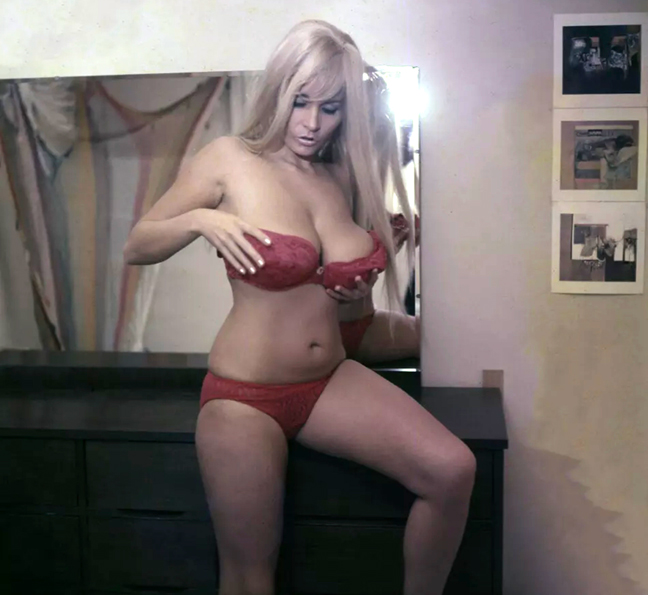

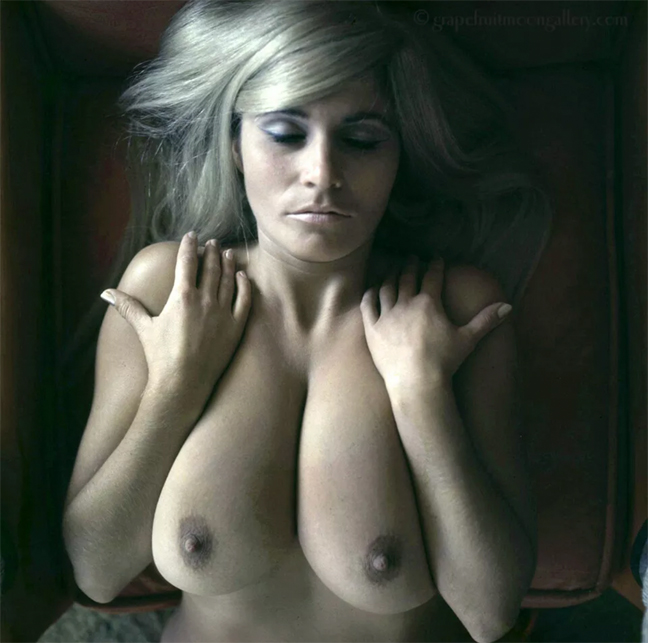
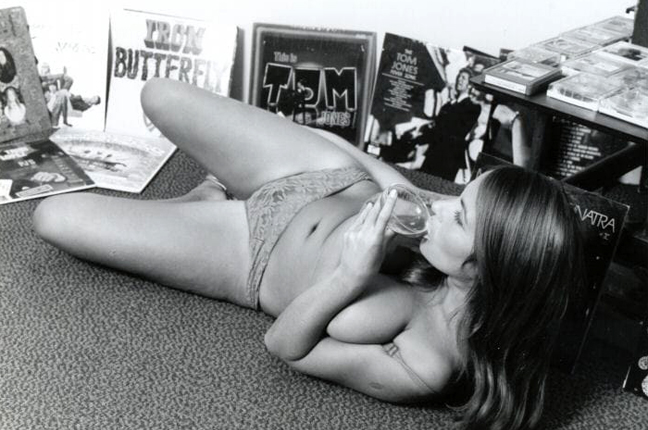
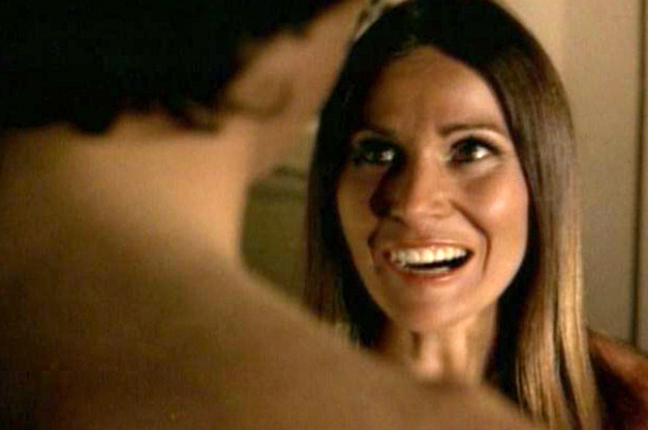
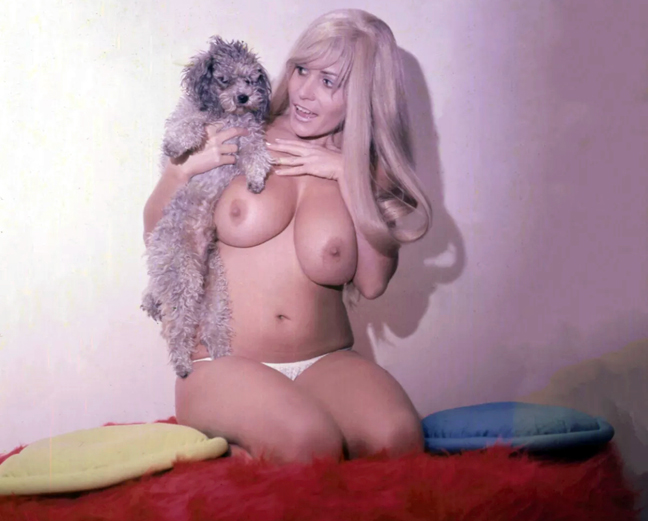
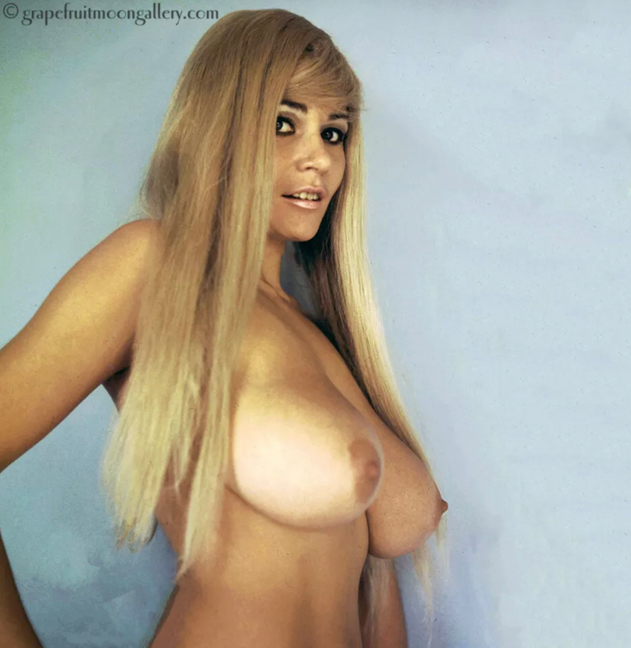
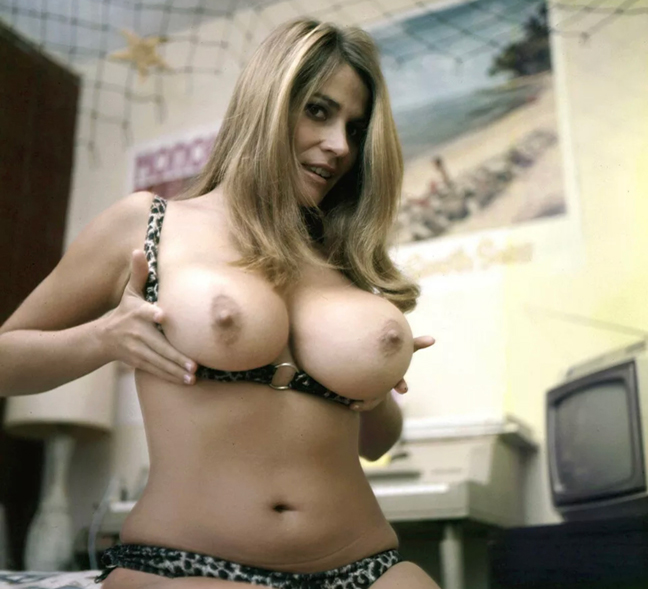
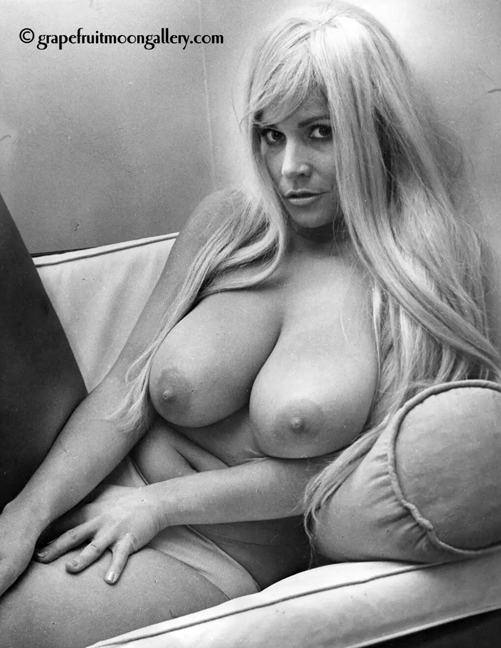
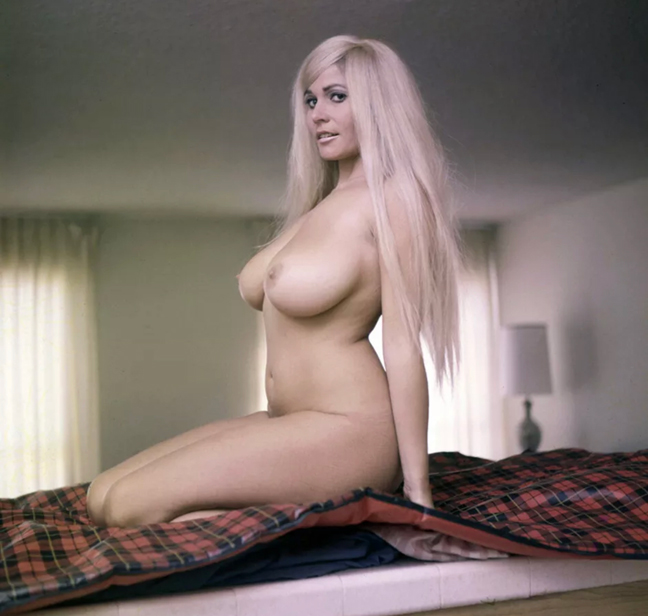
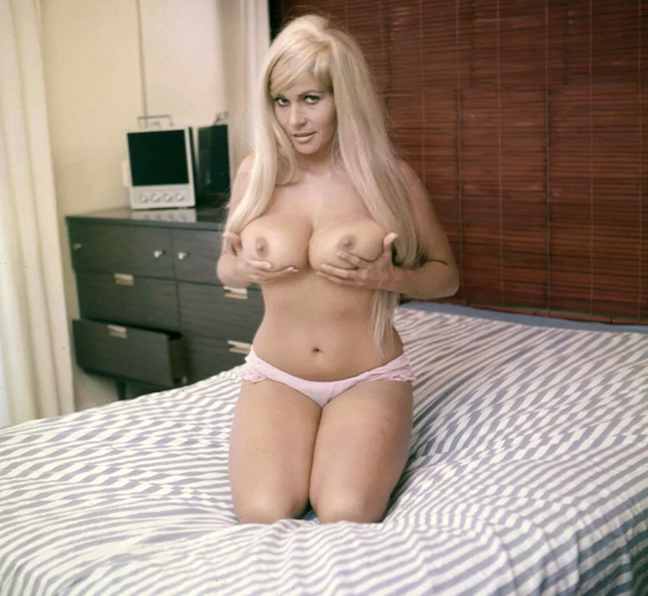
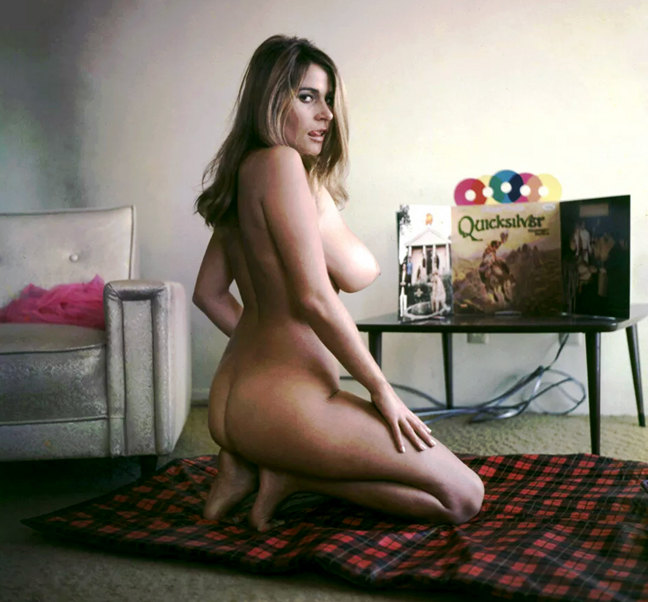
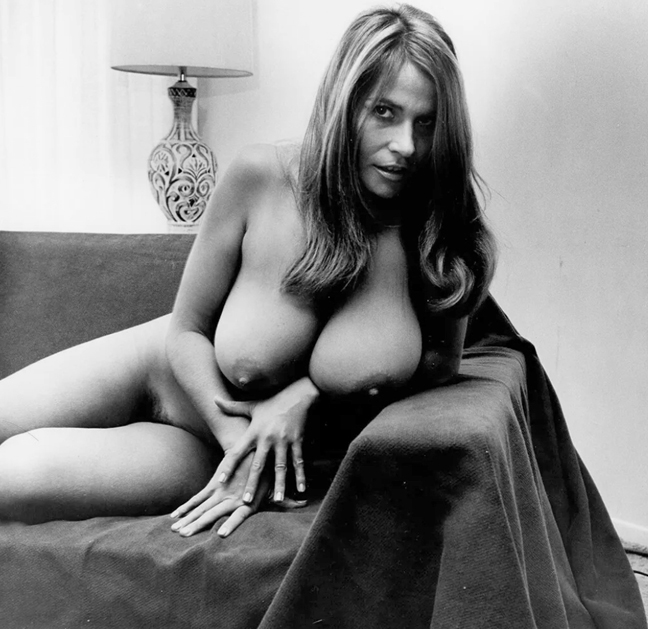
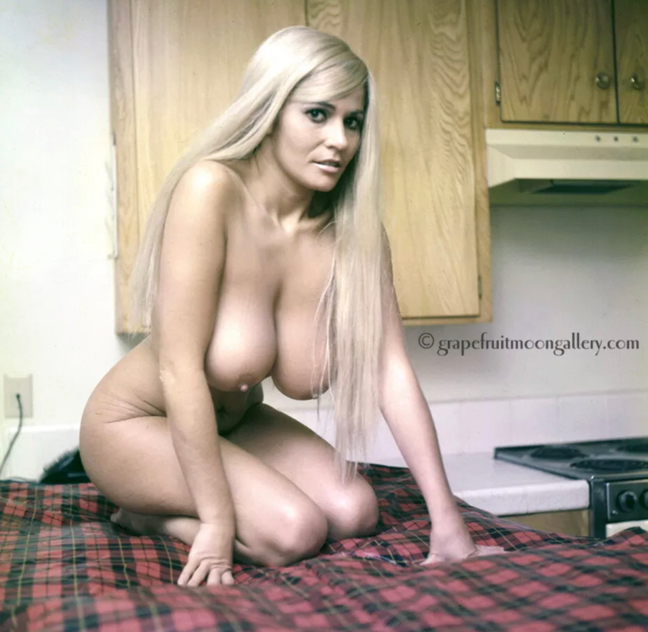
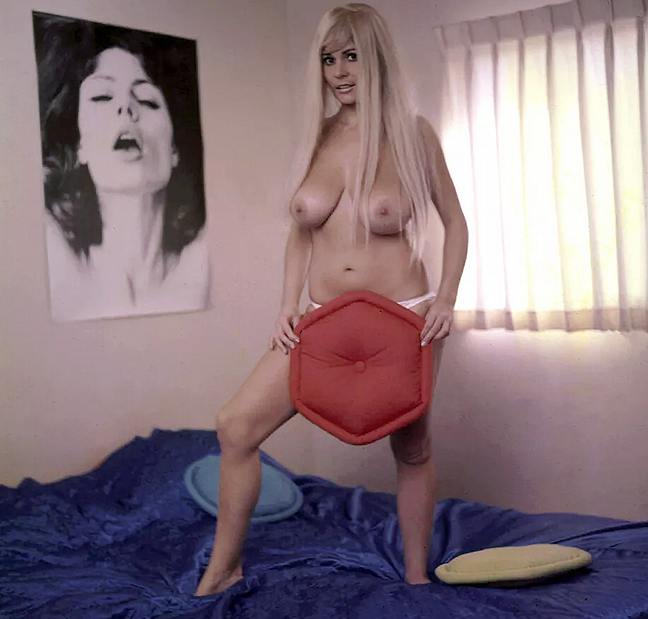
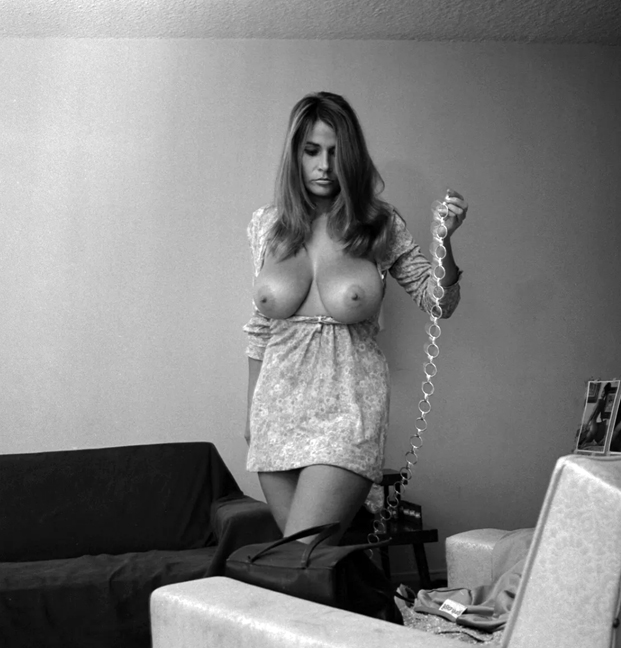
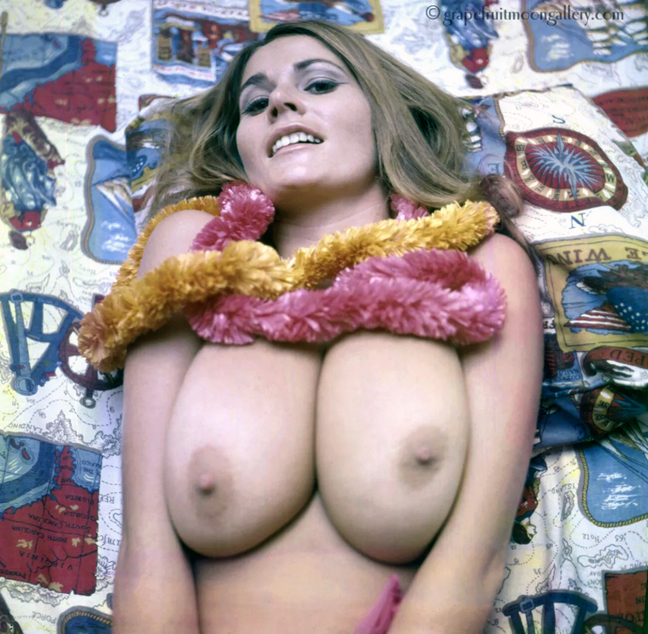
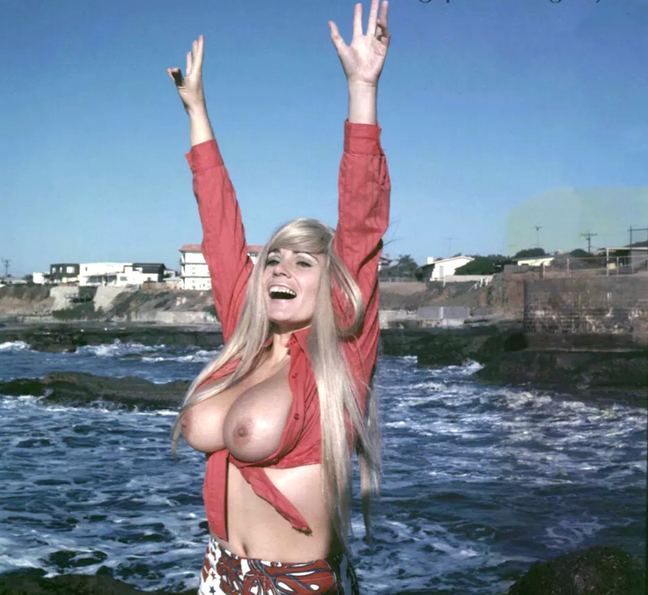
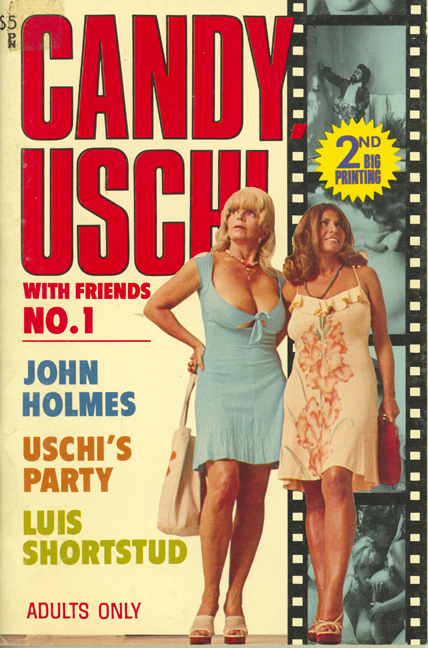
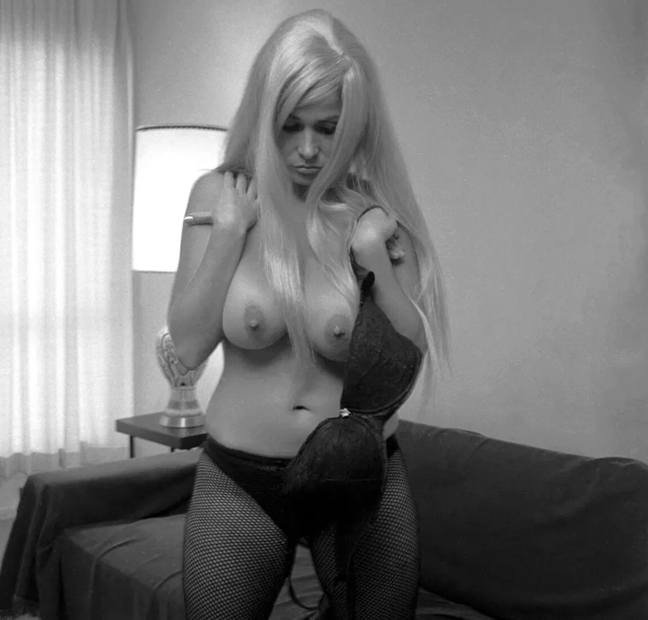
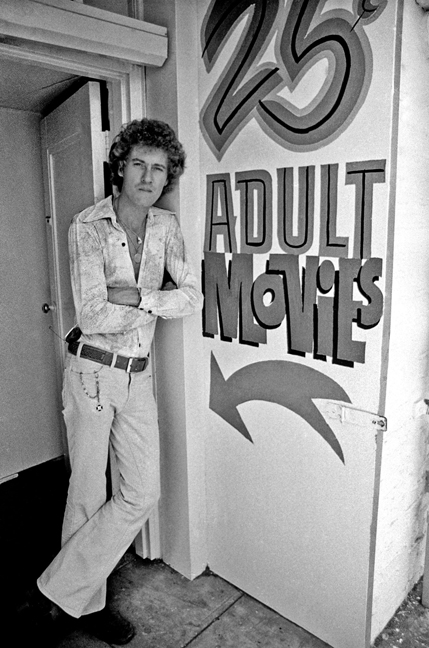
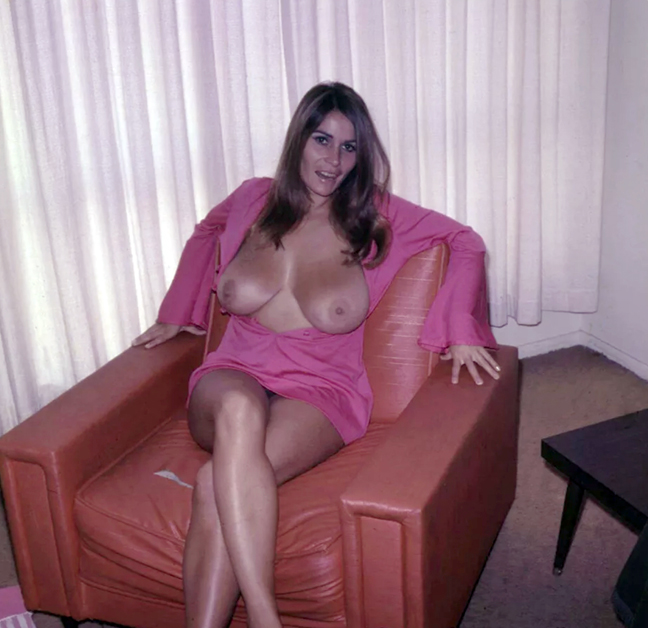
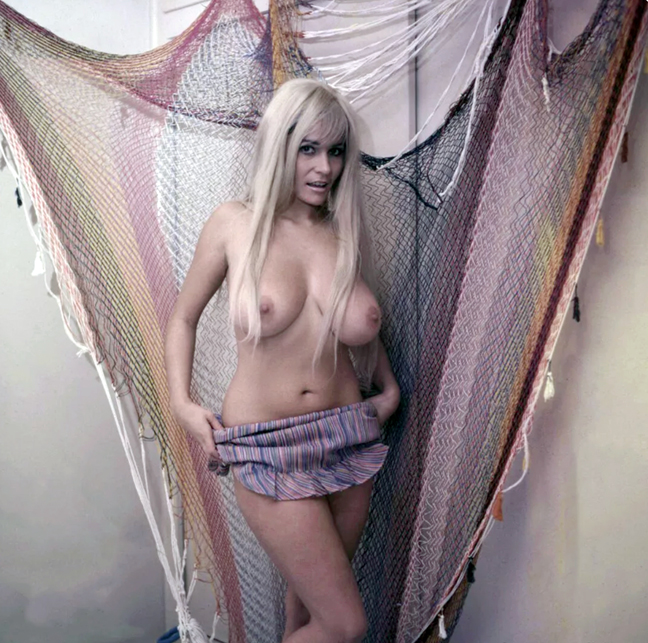
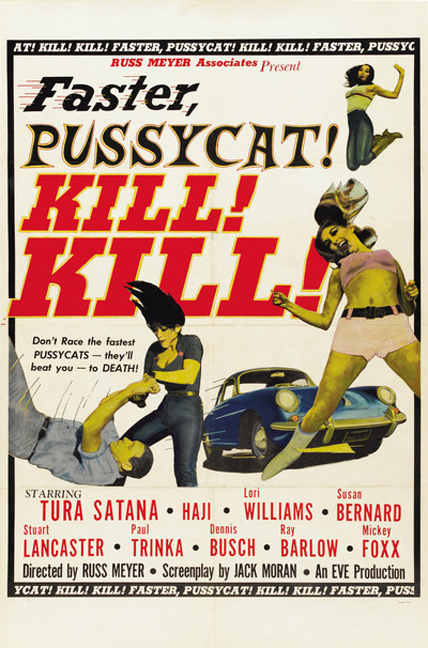
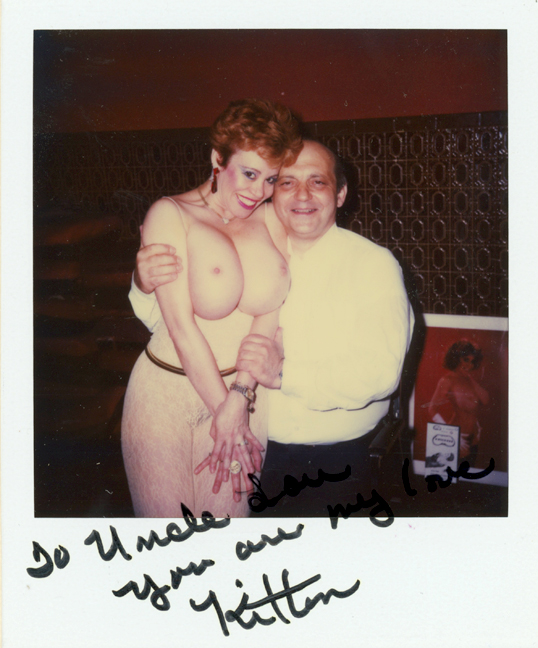
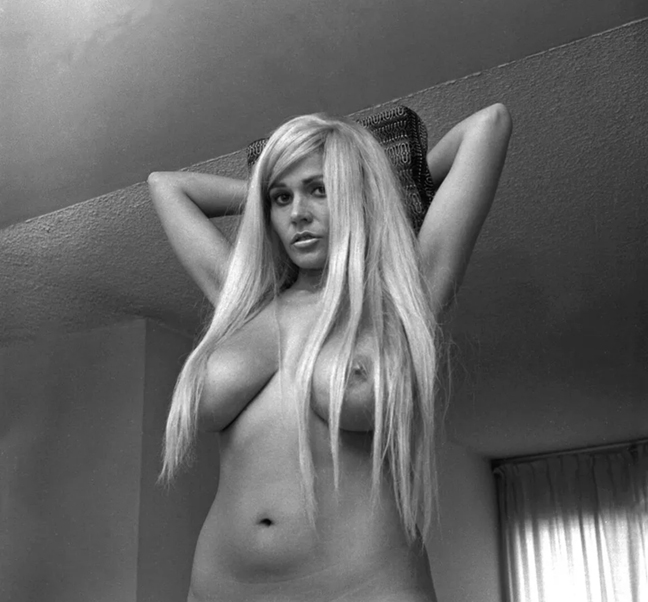
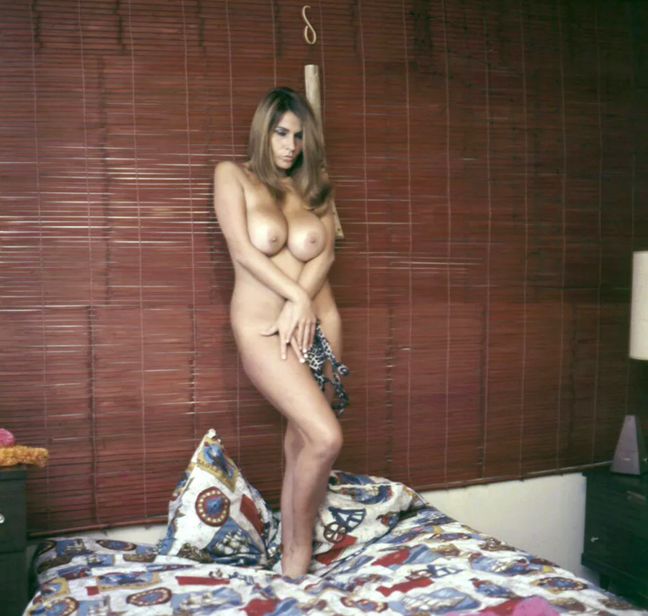
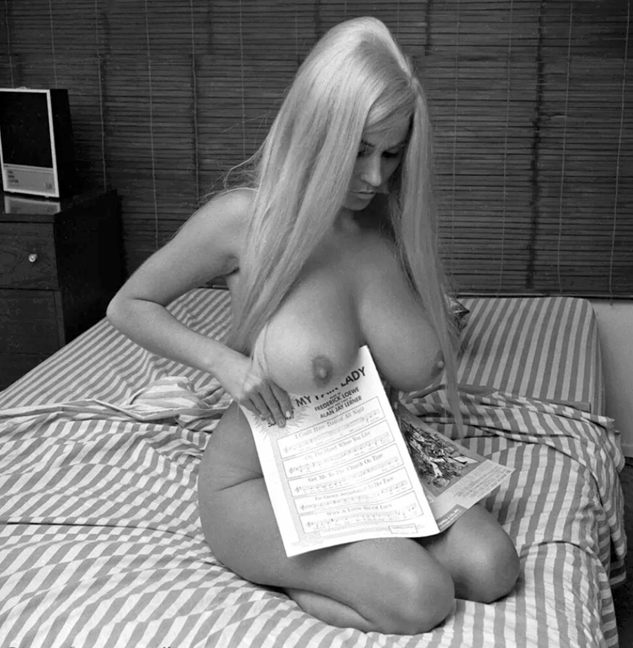
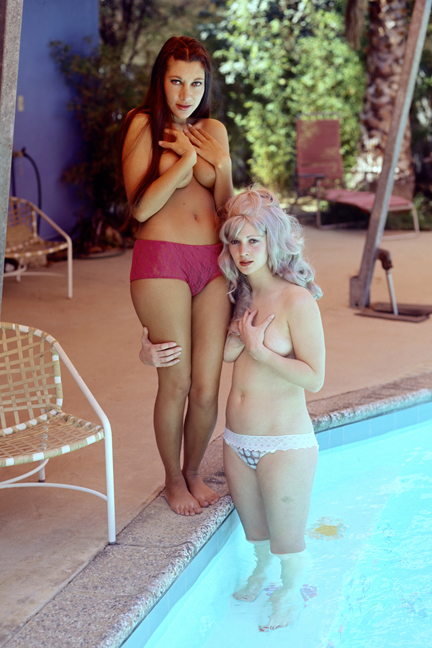
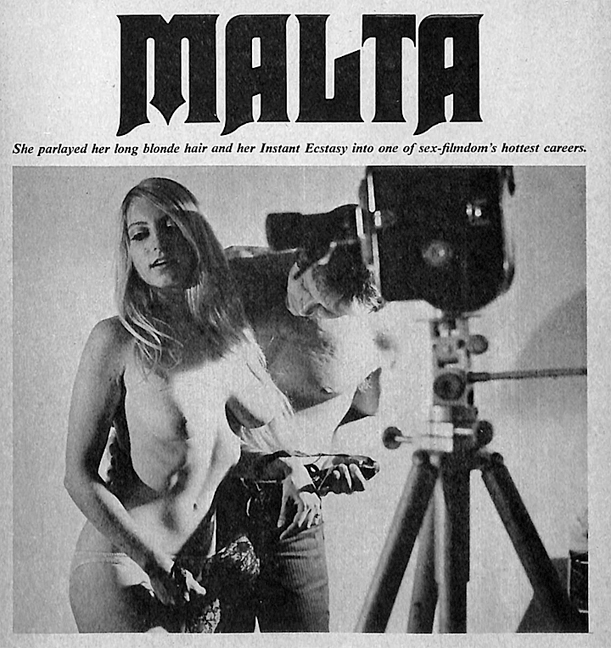

Uschi Digard So Sexy From The 70s Pinup Magazine Keep Up Good work Awesome Article And Podcast
Such an intelligent and sharp woman. Her physical assets were just a major plus.
As for her age, she was likely born sometime in 1945 (or late in 1944). In a late 1976 newspaper article, she said she was 31 then and in the May 1977 issue of Playboy gave her age as 32 (in a pictorial “Bewitched by older women”).
I could not agree more, Randy. Uschi is the kind of person who would have thrived given any opportunity. That she fell into the world of nude modeling and sexploitation films was pure chance, and the product was better because of it.
Fascinating! She has led quite the life.
The innocence the spirituality the love of the time all captured on film with Uschi.
Uschi and Deborah Mcguire are my favourites! Thanks for this text!
Great interview! Uschi was the most iconic of softcore actresses. She made her place as the go-to breasts of film in that era. Outstanding to hear this. Thank you.
Absolutely Brilliant! God bless you Uschi for what u did for Russ in his twilight years. You are a Legend ❤
Another fantastic interview, very happy to hear that she is going really well. I did not recall seeing any of her movies until I checked her IMDb record and saw that she was in “The Kentucky Fried Movie.” Her shower scene in that film made quite the impression on me when I was a young lad. Unforgettable!
The Uschinator is a one-off!
No matter how skeevy the “film”, you can see her intelligence/humor shining through.
Wish she had mentioned about working for Ed Wood (‘The Only House In Town’). though. 😉
Brilliant woman. Fantastic interview. Thanks.
I’d really like to see a pix of what she looks like, now.
Thanks for the interview!
The promotional photo of her in Russ Meyer’s ‘Supervixens’ will always be her defining look, especially for a 12 year old kid like me entering puberty.
The scene “Catholic High School Girls in Trouble” in Kentucky Fried Movie was vintage Uschi
Informative article on Uschi D. 🙂 I recall Uschi had a big part in the 1973 softcore movie BEAUTIES AND THE BEAST (it might have an alternate title, btw). There are 3 different versions of the movie, but what I recall the most is that it sounded like Uschi’s real voice on the soundtrack instead of a dubbed voice because she has quite a few lines.
All the best to Uschi in the present day.
‘Happy Trails to you, ‘until we meet again…’
Wow! Terrific, comprehensive interview! Well done and judos to a very impressive aging lady!
I think Uschi should negotiate no book signings and appearances, if that’s what she wants. We’d love to read more about such a superstar.
I tried to leave my comment earlier, but I don’t see it. I’ll try again. Back in the mid to late ‘70s, I recall seeing Uschi on the old Tomorrow Show with Tom Snyder. I don’t recall any tidbits, but it’s impossible to forget Uschi, especially on a major network broadcast back then. Does anyone have the same recollection? Maybe more details than me? I suppose it is impossible to find that show anywhere now, but maybe someone knows how to do so. Thanks to anyone who remembers this moment in tv history and any insights you can share.
And, of course, many thanks to Ashley, April, and the Rialto gang.
Dennis
I love how absolutely classy and intelligent Uschi is. The sexy modeling and softcore scene then was still fresh and had lots of room for artistic expression without being tasteless. The world was very different pre-internet back then.
This interview was gold, thank you so much.
A fascinating and interesting interview. All these years, I have admired the beauty and appealing performance talent of Uschi with no real idea of who she was/is. Obviously intelligent, independent and self directed, she was never the bimbo one might have thought she was. It makes me feel a little foolish to realize how easy it was to oversimplify her simply because she often had no clothing on. Too bad there wasn’t a current picture of her included in the post because it would have also been interesting to see how she has aged. Regardless, the interviewer was fantastic, obviously well prepared and confident in the varying contexts of his questions. Top notch work! Apparently I have been asleep for a long while, I just discovered this site today. Thanks
A wonderful investigative report as always! You do top notch work. I have especially enjoyed the Pat Barrington report and also Lorna Maitland. I was wondering if you had thought of finding out what happened to Shari Eubank. After she starred in Chesty Anderson U S Navy she seems to have vanished.
Thanks so much for all your hard work!
St. John Hunt
Uschi is my number one 60s busty model. I love this interview and thank you for it! I have quite a bit of her material from over the years. One question for anyone that may know. How many issues of the ‘Sherri’ magazine series did she do?
These were all strictly Uschi photo magazines. I’ve got 4 or 5, I would have to dig them out to get the exact number I have but wondering if anyone knows the total number of issues of this magazine? Thanks.